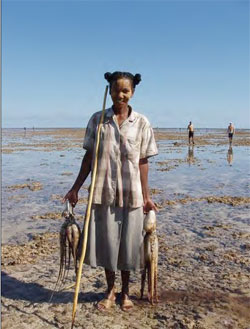Marine protected areas boost fishing yields
Marine protected areas boost fishing yields
mongabay.com
December 18, 2006
A new study conducted on the reefs of Madagascar found that marine protected areas can benefit the fishing industry
The study, authored by Frances Humber, a scientist with conservation group Blue Ventures, found that implementing seasonal fishing closures for octopus boosted returns for fishermen when the closed areas were reopened to fishing after seven months. Octopus yields increased 13 times while the total weight of octopus caught jumped 25 times.
“The increase in octopus numbers and weight was far greater than we ever expected,” said Alasdair Harris, scientific director of Blue Ventures, the marine conservation group that conducted the study. “This study shows that [marine protected areas (MPAs)] not only serve as a powerful conservation tool helping species thrive, but can also be a powerful economic tool helping fisheries remain productive and profitable.”
 Photo courtesy of Blue Ventures. |
Though the size and weight of octopus eventually returned to pre-closure levels, the study showed that reef management can pay dividends for fishermen.
According to Blue Ventures, an organization that is almost entirely funded through ecotourism revenue, octopus are the major economic resource for villagers in the region, resulting in local overfishing especially with the arrival of international fishing companies in the area. However, after the second reopening of the fishing area, village leaders placed tighter restrictions on the amount of octopus fishing and are planning to implement future closures. Madagascar is currently one of the few African nations that are increasing its octopus fishery output — octopus fisheries in other parts of Africa have peaked and are beginning to decline according to Blue Ventures.
“The success of Andavadoaka’s MPA shows there is hope that well-managed fishery practices, such as MPAs, can prevent Madagascar from suffering the damaging effects of overfishing that so many other African nations are dealing with today,” Harris said.